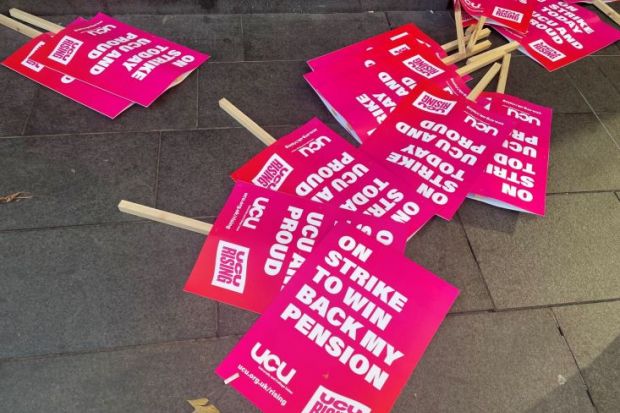Tomorrow will be the second of 18 strike days planned by the UK’s University and College Union for February and March.
Under the inspiring banner of #UCUrising and with the biggest mandate in the union’s history, academics are fighting on four fronts: to reinstate pensions benefits; to close gender, race and disability pay gaps; to end casualisation; and to achieve an inflation-level pay rise of about 10 per cent.
After receiving notice of the 18 strike days, the Universities and Colleges Employers Association (Ucea) increased its previous offer. But UCU general secretary Jo Grady immediately rejected the proposal, claiming it would “do little to protect our members in a cost-of-living crisis”. Moreover, the latest offer is not “at the limit of what a sector with over £40 billion in reserves can afford”.
But the word “sector” here is deeply problematic, as is the implied intention to force employers operating in an unstable and unequal market to stretch to “the limit” of affordability. However laudable the aims of the strike (especially real action to close discriminatory pay gaps), the repeated claims by the union about a “sector” and an “employer” are, at best, inaccurate and, at worst, a wilful misrepresentation of the reality of the current higher education environment in England.
In the past 24 months, catastrophic redundancies have been announced by the universities of Leicester, Roehampton, Wolverhampton and East Anglia, as well as the University of London colleges of Goldsmiths and Birkbeck, all citing plummeting student numbers and increasing operating deficits.
During the same period, many (but not all) universities in the buoyant Russell Group have seen rocketing student numbers, rapid expansion, capital investments and record surpluses. So, while it is accurate to say that the industry in toto has combined reserves of £40 billion, it is dangerously disingenuous to use that as a rallying call.
Since the removal of student number caps by then chancellor of the Exchequer George Osborne in 2014-15, there is no mechanism to ensure equitable revenue distribution across English universities. In this sense, there is patently no singular “limit” to what individual universities can afford. A comfortable limit for UCL, with an operating surplus of about £90 million, will undoubtedly be unaffordable for City, University of London, with an operating surplus of about £1 million. The question remains, then, to borrow the UCU’s phrase: how best to “protect our members”, given that those members are in radically different situations?
There are several possible solutions. Raising tuition fees is one – but this would force risk-averse working-class and under-represented students out of higher education, undoing years of vital access work. Even more drastically, we could allow institutions to set their own pay scales – but this would compound existing inequities and create a tiered system.
The only other option is to negotiate a pay rise that does not jeopardise struggling institutions – perhaps allowing wealthier universities to copy the model of Oxbridge and the big London universities by offering “living allowance” top-ups.
UCU members frequently send their thoughts and prayers, or “solidarity”, to colleagues faced with compulsory redundancy, while simultaneously insisting that any offer below 10 per cent is unacceptable. An offer closer to that figure will inevitably be made by Ucea in the coming weeks – certainly by late spring exam periods. Those securely employed at expanding universities will see their wages increase, but there will without question follow swift and widespread job losses at more vulnerable universities, predominantly across the already threatened arts and humanities.
We would all love a 10 per cent pay rise to help with increasing living costs. But any settlement should not threaten the livelihoods of colleagues or programmes, especially those catering to working-class, first-generation and otherwise historically marginalised, deprived or excluded students. This would, in effect, return England to a pre-92 situation in which only the wealthy attend university and the working classes are pushed into industry (which would, at least, conveniently fill the post-Brexit gap left by migrant European workers).
Department closures at post-92s would also represent a significant loss to class diversity at the academic level given that Russell Group universities almost exclusively recruit from within, and almost every Russell Group academic has passed through Oxbridge. Given all this, it is actually hard to see how a single bargaining body can “protect” the interests of those calling for significantly higher wages and those whose positions will become untenable if that is achieved.
A radical solution would be to have separate unions representing the interests of staff at longer-established universities and those many more staff at newer institutions, with Ucea mediating those needs. That is, in essence, what is happening now, only with one union and disparate needs there is unlikely to be a settlement that protects the poorest students or programmes.
Another way would be for the UCU to be more ambitious in its goals, to address the causes and not just the symptoms of a failing funding model. That is, it could campaign for the return of student caps to redistribute revenue across the “sector”. This might be a hard cause for the UCU to rally members around, but if it really takes solidarity seriously, it would be a good next step.
Peter Sloane is senior lecturer and programme director in English at the University of Buckingham.




